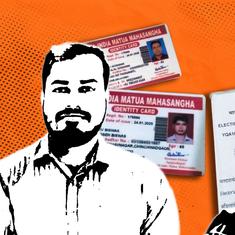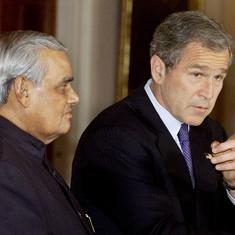Arrest warrant against Arvind Kejriwal for not appearing before Assam court in Modi defamation case
The judge dismissed the Delhi chief minister’s request for more time to appear as he is campaigning for the civic body polls.

A court in Assam on Tuesday issued a bailable arrest warrant against Delhi Chief Minister Arvind Kejriwal for not appearing before the bench on Monday in connection with a defamation case. A Diphu court had summoned Kejriwal in the criminal defamation case filed against him by Assam BJP leader Surya Rongphar over his tweet on Prime Minister Narendra Modi’s educational qualifications, NDTV reported.
The Aam Aadmi Party chief’s lawyer Gurpreet Singh Uppal had requested the court to excuse him on April 7 and give him more time to appear in the case as he was in the midst of campaigning for the April 23 civic body polls in Delhi. The counsel had said Kejriwal “cannot leave Delhi to attend the court hearing because of the civic elections and the nature of his work as the chief minister of Delhi”.
Judicial Magistrate Naba Kumar Deka Baruah in Diphu, Karbi Anglong district, highlighted that the AAP leader had failed to appear before the court on January 30 and rejected the request, issuing a Rs 10,000 warrant against him, according to Hindustan Times. The next hearing in the defamation case is scheduled for May 8.
Rongphar had filed the suit against Kejriwal for his Twitter post dated December 15, 2016, in which he had alleged that Modi’s college degree was fake and he had studied only till Class 12. The Assam BJP leader had called the claim “baseless and misleading”.
Kejriwal and the AAP have maintained that Modi’s degree from Delhi University was fake. But the DU registrar had said last year that the prime minister had “cleared the examination in 1978 and was awarded the degree in 1979”.
In January, the Central Information Commission had directed DU to allow the inspection of records of students who had secured their BA degree in 1978, including Modi’s. The commission dismissed DU Central Public Information Officer Meenakshi Sahay’s denial of a Right to Information query on the grounds that the information was personal, saying the rejection had “neither merit, nor legality”.









